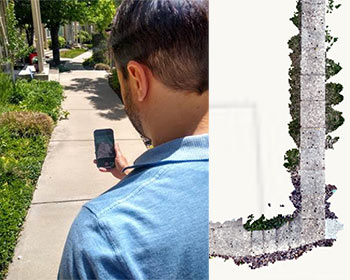

MPC |
| Title: | Pedestrian Infrastructure and ADA Compliance: Leveraging Advances in Spatial Technologies |
| Principal Investigators: | Wesley Marshall and Bruce Janson |
| University: | University of Colorado Denver |
| Status: | Completed |
| Year: | 2021 |
| Grant #: | 69A3551747108 (FAST Act) |
| Project #: | MPC-678 |
| RiP #: | 01790426 |
| RH Display ID: | 159083 |
| Keywords: | compliance, curbs, geographic information systems, infrastructure, laser radar, legislation, mapping, sidewalks, smartphones |
 Cities are increasingly facing costly litigation because of their inability to build and maintain sidewalks and curb ramps that comply with the Americans with Disabilities Act (ADA) of 1990. The underlying problem is often less about willingness and more about a lack of good data. This research project will examine the use of mobile LiDAR (Light Detection and Ranging) technology to measure the ADA compliance of sidewalks and curb ramps. While historically expensive and somewhat difficult to employ at scale, high-density LiDAR has become much more commonplace and is standard on higher-end iPhones and iPads. The proposed project seeks to create a map of ADA sidewalk and sidewalk ramp compliance issues using iPhone LiDAR. This will include a comparison of sidewalk metrics from planimetric data to on-the-ground LiDAR sidewalk infrastructure data collection. We will compare the results of the iPhone LiDAR to manual methods, planimetric data, as well as data derived from a much higher-end LiDAR data collection device. We will also compare our ability to measure sidewalk issues from the sidewalk versus the street and consider how this differs by different possible occlusion issues (such as on-street parking). Lastly, we will explore built environment data against sidewalk infrastructure data to identify what factors are significantly associated with ADA compliance issues. The resulting ADA compliance maps will be integrated into a GIS platform for deployment into web-mapping and mobile-mapping applications. Given that 1 in 7 Americans has a mobility-related disability, this is about more than asset management and protecting cities from liability; it will help put cities on a data-driven path towards fulfilling the promise of the ADA.
Cities are increasingly facing costly litigation because of their inability to build and maintain sidewalks and curb ramps that comply with the Americans with Disabilities Act (ADA) of 1990. The underlying problem is often less about willingness and more about a lack of good data. This research project will examine the use of mobile LiDAR (Light Detection and Ranging) technology to measure the ADA compliance of sidewalks and curb ramps. While historically expensive and somewhat difficult to employ at scale, high-density LiDAR has become much more commonplace and is standard on higher-end iPhones and iPads. The proposed project seeks to create a map of ADA sidewalk and sidewalk ramp compliance issues using iPhone LiDAR. This will include a comparison of sidewalk metrics from planimetric data to on-the-ground LiDAR sidewalk infrastructure data collection. We will compare the results of the iPhone LiDAR to manual methods, planimetric data, as well as data derived from a much higher-end LiDAR data collection device. We will also compare our ability to measure sidewalk issues from the sidewalk versus the street and consider how this differs by different possible occlusion issues (such as on-street parking). Lastly, we will explore built environment data against sidewalk infrastructure data to identify what factors are significantly associated with ADA compliance issues. The resulting ADA compliance maps will be integrated into a GIS platform for deployment into web-mapping and mobile-mapping applications. Given that 1 in 7 Americans has a mobility-related disability, this is about more than asset management and protecting cities from liability; it will help put cities on a data-driven path towards fulfilling the promise of the ADA.
Note to project PIs: please use the Track Changes feature when editing the above Word file(s). Updated document(s) should be emailed to ndsu.ugpti@ndsu.edu.